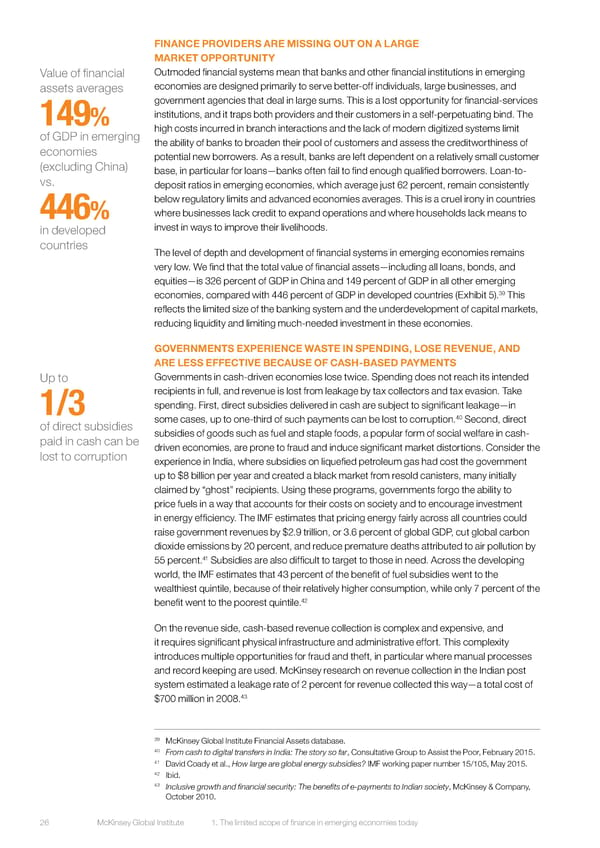FINANCE PROVIDERS ARE MISSING OUT ON A LARGE MARKET OPPORTUNITY Value of financial Outmoded financial systems mean that banks and other financial institutions in emerging assets averages economies are designed primarily to serve better-off individuals, large businesses, and government agencies that deal in large sums. This is a lost opportunity for financial-services 149% institutions, and it traps both providers and their customers in a self-perpetuating bind. The of GDP in emerging high costs incurred in branch interactions and the lack of modern digitized systems limit economies the ability of banks to broaden their pool of customers and assess the creditworthiness of (excluding China) potential new borrowers. As a result, banks are left dependent on a relatively small customer base, in particular for loans—banks often fail to find enough qualified borrowers. Loan-to- vs. deposit ratios in emerging economies, which average just 62 percent, remain consistently below regulatory limits and advanced economies averages. This is a cruel irony in countries 446% where businesses lack credit to expand operations and where households lack means to in developed invest in ways to improve their livelihoods. countries The level of depth and development of financial systems in emerging economies remains very low. We find that the total value of financial assets—including all loans, bonds, and equities—is 326 percent of GDP in China and 149 percent of GDP in all other emerging 39 economies, compared with 446 percent of GDP in developed countries (Exhibit 5). This reflects the limited size of the banking system and the underdevelopment of capital markets, reducing liquidity and limiting much-needed investment in these economies. GOVERNMENTS EXPERIENCE WASTE IN SPENDING, LOSE REVENUE, AND ARE LESS EFFECTIVE BECAUSE OF CASH-BASED PAYMENTS Up to Governments in cash-driven economies lose twice. Spending does not reach its intended recipients in full, and revenue is lost from leakage by tax collectors and tax evasion. Take 1/3 spending. First, direct subsidies delivered in cash are subject to significant leakage—in 40 of direct subsidies some cases, up to one-third of such payments can be lost to corruption. Second, direct paid in cash can be subsidies of goods such as fuel and staple foods, a popular form of social welfare in cash- lost to corruption driven economies, are prone to fraud and induce significant market distortions. Consider the experience in India, where subsidies on liquefied petroleum gas had cost the government up to $8 billion per year and created a black market from resold canisters, many initially claimed by “ghost” recipients. Using these programs, governments forgo the ability to price fuels in a way that accounts for their costs on society and to encourage investment in energy efficiency. The IMF estimates that pricing energy fairly across all countries could raise government revenues by $2.9 trillion, or 3.6 percent of global GDP, cut global carbon dioxide emissions by 20 percent, and reduce premature deaths attributed to air pollution by 41 Subsidies are also difficult to target to those in need. Across the developing 55 percent. world, the IMF estimates that 43 percent of the benefit of fuel subsidies went to the wealthiest quintile, because of their relatively higher consumption, while only 7 percent of the 42 benefit went to the poorest quintile. On the revenue side, cash-based revenue collection is complex and expensive, and it requires significant physical infrastructure and administrative effort. This complexity introduces multiple opportunities for fraud and theft, in particular where manual processes and record keeping are used. McKinsey research on revenue collection in the Indian post system estimated a leakage rate of 2 percent for revenue collected this way—a total cost of 43 $700 million in 2008. 39 McKinsey Global Institute Financial Assets database. 40 From cash to digital transfers in India: The story so far, Consultative Group to Assist the Poor, February 2015. 41 David Coady et al., How large are global energy subsidies? IMF working paper number 15/105, May 2015. 42 Ibid. 43 Inclusive growth and financial security: The benefits of e-payments to Indian society, McKinsey & Company, October 2010. 26 McKinsey Global Institute 1. The limited scope of finance in emerging economies today
 DIGITAL FINANCE FOR ALL Page 37 Page 39
DIGITAL FINANCE FOR ALL Page 37 Page 39